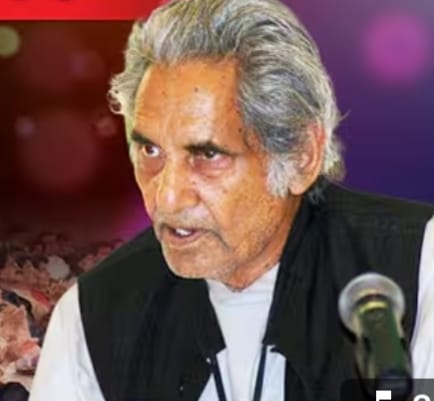Gopaldas Neeraj
Poet, professor, philosopher, and perennial optimist—Gopaldas Saxena ‘Neeraj’ carved his name into the heart of Hindi literature with verses that were simple yet stirring, personal yet universal. Neeraj belonged to a rare breed of poets who could straddle two dramatically different worlds: the quiet cadence of literary verse and the raucous, rhythm-driven world of Hindi cinema.
Born on January 4, 1925, in Etawah, Uttar Pradesh, Gopaldas Neeraj’s life was marked by struggle from an early age. He lost his father at a young age and supported his family while pursuing his education. It is perhaps this early exposure to hardship that gave Neeraj’s poetry its unshakeable emotional resonance. His verses often reflect a man who had seen pain, but who chose to respond to it with wisdom and music rather than despair.
The Style and Substance
Neeraj’s poetry wears the cloak of accessibility. His diction is rarely obscure, and his metaphors are deeply rooted in the Indian soil. Yet, beneath this simplicity lies a rich tapestry of thought. He was deeply influenced by Romanticism, the Bhakti movement, and the progressive literary movement. Unlike many modern poets, Neeraj didn’t see complexity as a virtue in itself. His belief was clear: poetry must move the heart. And move it did.
He often employed everyday symbols to elevate ordinary experiences into profound truths. A flower, a bird, the setting sun—these were never just background elements in his poems. They were active participants in the emotional journey. One of his most quoted lines, “Karvan guzar gaya, gubar dekhte rahe” (The caravan passed by, we kept watching the dust), showcases his command over brevity, imagery, and philosophical weight.
The Lyricist
While many literary purists shy away from popular culture, Neeraj embraced it. In the 1960s and 70s, he became one of the most sought-after lyricists in the Hindi film industry. His collaborations with composers like Shankar-Jaikishan and S. D. Burman produced timeless songs such as:
Phoolon ke rang se, dil ki kalam se (from Prem Pujari)
Likhe jo khat tujhe (from Kanyadaan)
Ae bhai, zara dekh ke chalo (from Mera Naam Joker)
These songs were poetic in a way that Hindi film music rarely allows. They didn’t just rhyme—they philosophized, they questioned, they consoled. Neeraj had an almost magical ability to smuggle profound philosophical inquiry into popular tunes. He wasn’t writing for the masses; he was speaking to them. And they listened.
But Neeraj’s journey in Bollywood wasn’t all roses. He walked away from the industry after the deaths of his close collaborators Jaikishan and S. D. Burman. The industry’s growing commercialism didn’t sit well with him. “Main kavita ke liye jeeta hoon, vyapaar ke liye nahi,” he once said—I live for poetry, not for commerce.
A Public Intellectual
Beyond the stage and the silver screen, Neeraj was an influential voice in India’s cultural and political landscape. He taught Hindi literature at Dharma Samaj College in Aligarh, and his lectures were legendary. Unlike many academics who cloister themselves in jargon, Neeraj believed in clarity, in engagement, in dialogue. He was appointed the Chancellor of Mangalayatan University and received the Padma Shri and Padma Bhushan awards from the Indian government.
Yet, accolades didn’t change him. He remained rooted, both in his worldview and his language. Even at mushairas and kavi sammelans, where poets often lean into performance, Neeraj’s strength was his sincerity. He didn’t perform poetry; he conversed with it, and through it, with his audience.
A Philosophy of Hope
If there’s a single thread that runs through Neeraj’s life and work, it is this: hope in the face of sorrow. His poetry doesn’t ignore grief; it walks with it, questions it, and ultimately transcends it. In a society perpetually divided by class, caste, and creed, Neeraj’s poems imagined a more compassionate world—not through slogans, but through sentiment.
He believed in the essential dignity of the individual, in the transformative power of love, and in the ultimate unity of all human experiences. His was not a utopian vision; it was a deeply grounded one, born not of idealism but of lived truth.
In one of his most iconic lines, he writes:
“Jeevan ka saundarya yahi hai, dukh mein bhi geet ho”
(The beauty of life is this, that even in sorrow there is song.)
Legacy
Gopaldas Neeraj passed away on July 19, 2018, but his voice echoes on. Students still quote him in classrooms, lovers still hum his songs, and strangers still discover his poems online and feel—somehow—that he has spoken directly to them.
In an age of noise, Neeraj was melody. In an era of disillusionment, he offered meaning. He proved that poetry doesn’t have to shout to be heard; it only needs to be honest.
And in doing so, Neeraj did more than write poetry. He became it.
[Dr Afroz Ashrafi is a Faculty Member in the Department of English at The College of Commerce, Arts and Science University, PatiliPutra ]






